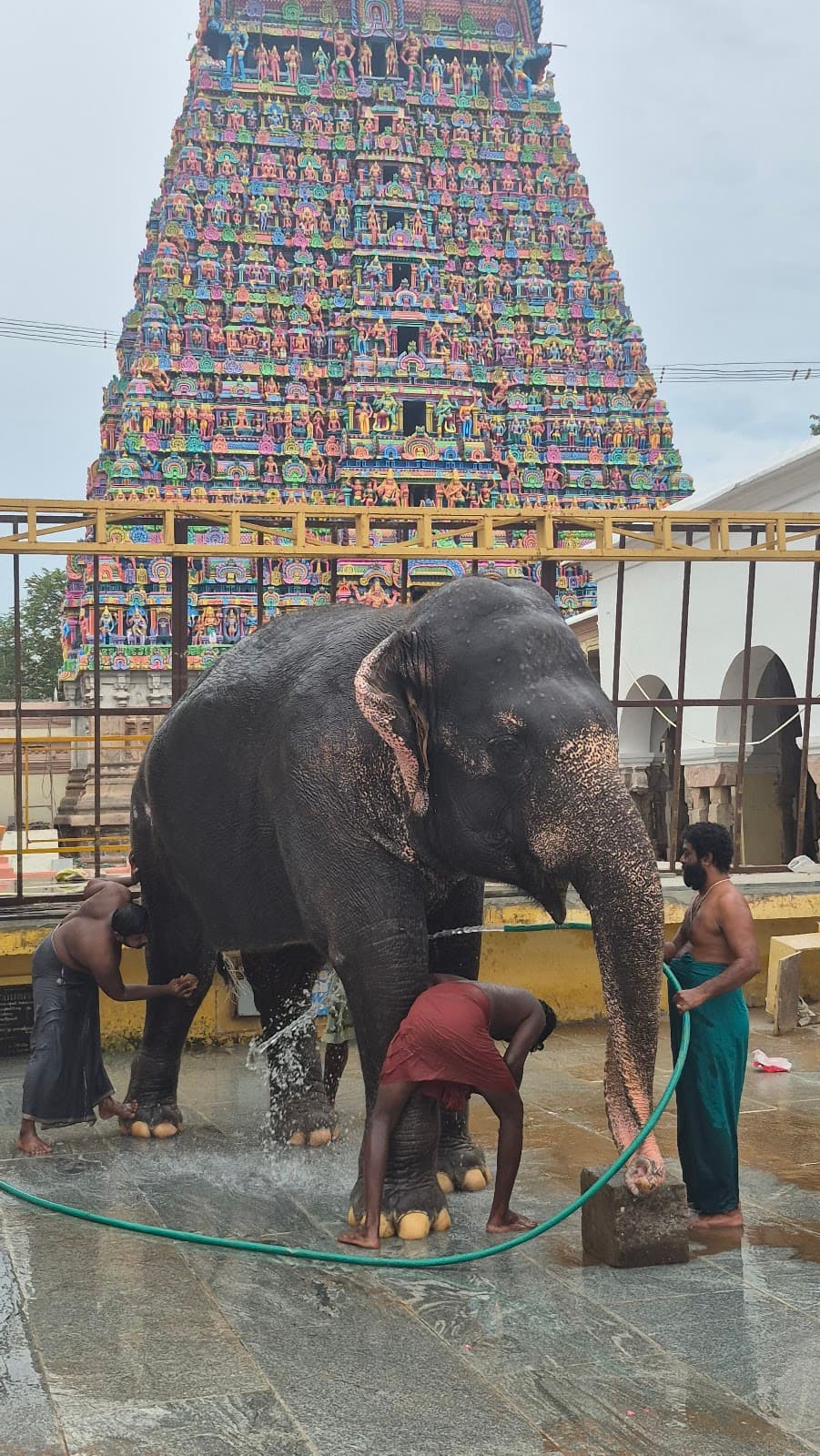
Adi Kumbeswarar Temple Kumbakonam
Ancient Shiva temple with a sacred lingam formed from nectar, showcasing stunning Chola architecture and a beloved temple elephant.
Highlights
Must-see attractions

Social
From TikTok & Reddit
Best Time
Beat the heat and crowds

Adi Kumbeswarar Temple Kumbakonam
Best Time
Beat the heat and crowds
Highlights
Must-see attractions
Ancient Shiva temple with a sacred lingam formed from nectar, showcasing stunning Chola architecture and a beloved temple elephant.
"A must-visit temple in Kumbakonam, offering a blend of spiritual depth and architectural marvel."
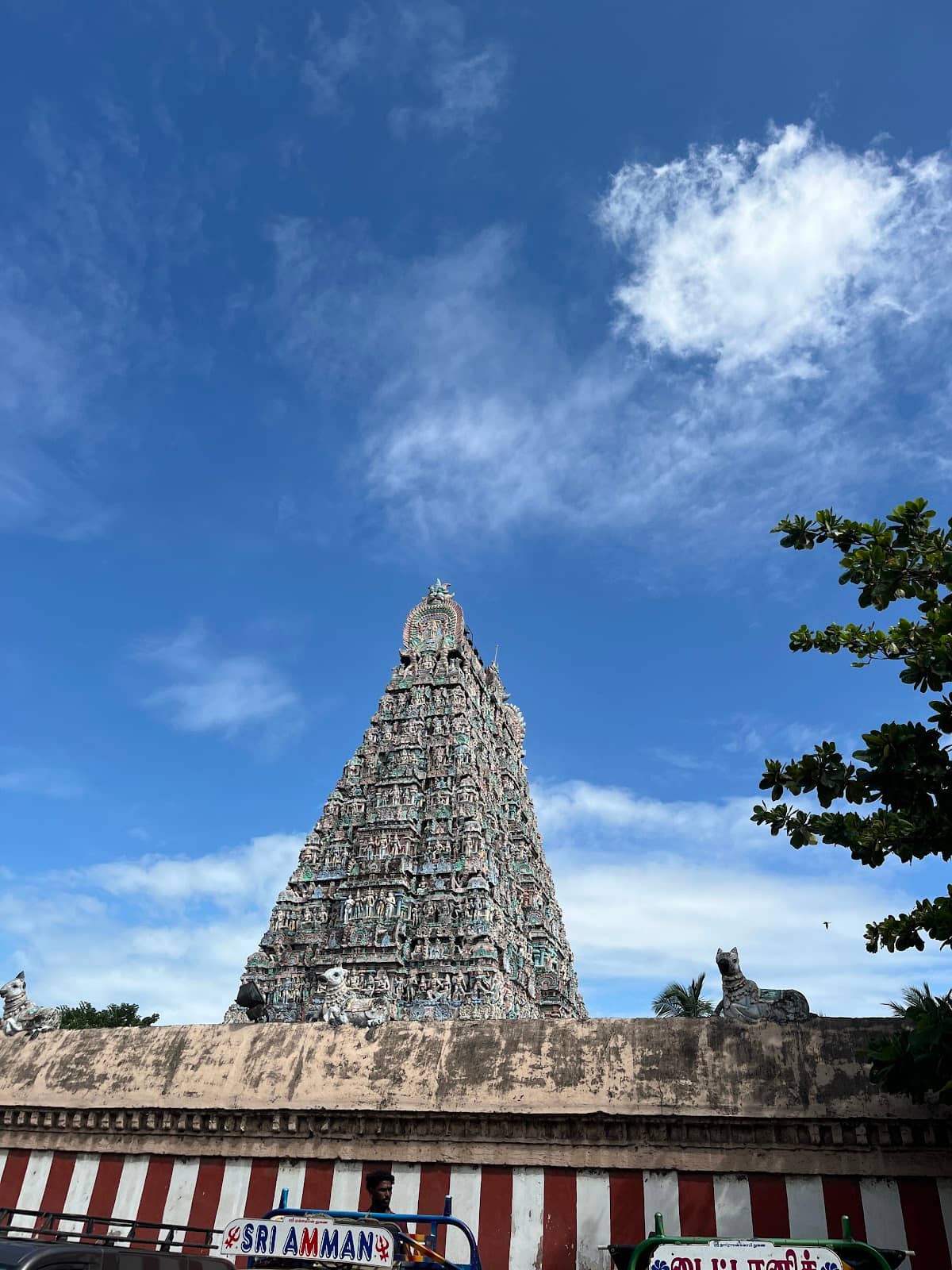
🎯 Dress Modestly
Cover shoulders and knees out of respect for the religious site.
💰 Carry Small Change
For donations, elephant blessings, and small purchases.
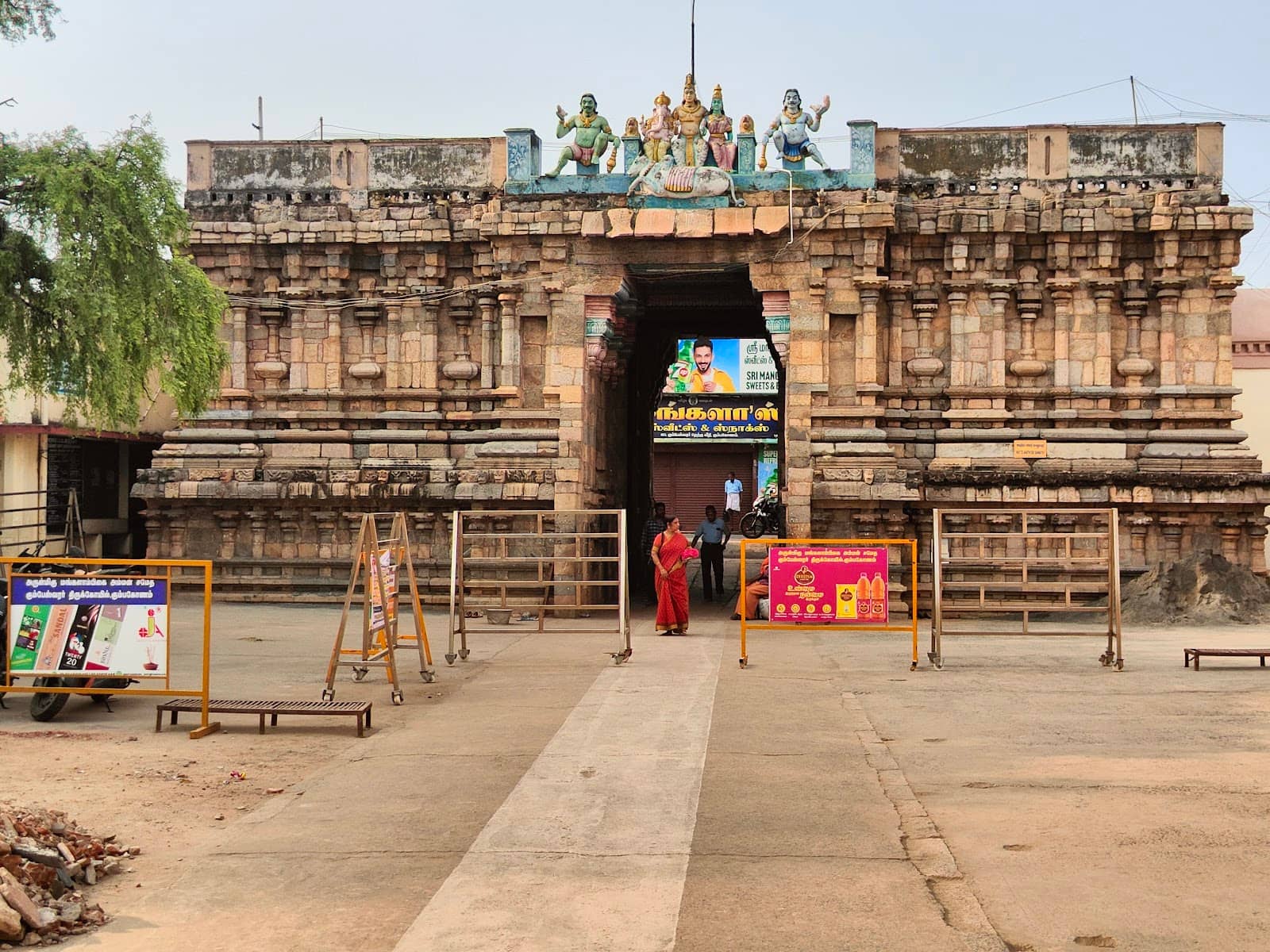
Highlights
Discover the most iconic attractions and experiences

The Sacred Adi Kumbeswarar Lingam
The ancient, conical Shiva Lingam, believed to be formed from nectar and sand by Lord Shiva himself.

Mangalambigai Amman Shrine
To the left of the main sanctum
A dedicated shrine for the consort of Lord Shiva, offering a peaceful spiritual experience.
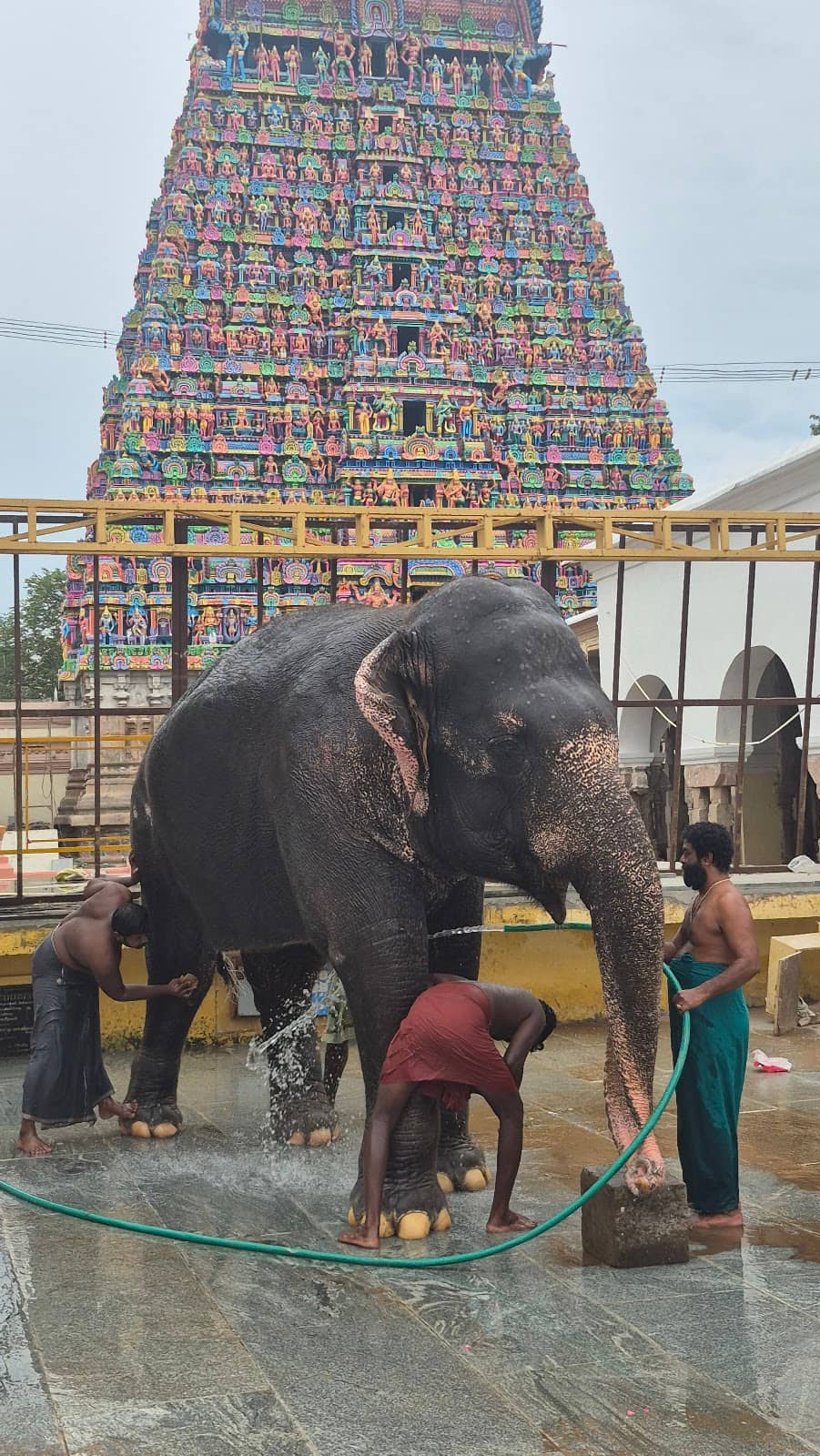
Temple Elephant Blessings
Meet and receive blessings from the temple elephant, a beloved and well-cared-for resident.

Intricate Chola Architecture
Marvel at the ancient Chola dynasty architecture, including ornate carvings and towering gopurams.
Plans like a pro.
Thinks like you
Planning Your Visit
Timing Your Visit for Serenity
Embrace the Local Vibe
Best Times
Insider Tips
from TikTok, Instagram & Reddit
🎯 Dress Modestly
Cover shoulders and knees out of respect for the religious site.
💰 Carry Small Change
For donations, elephant blessings, and small purchases.
👟 Comfortable Footwear
You'll be doing a lot of walking within the large complex.
📸 Respectful Photography
Be mindful of where photography is permitted and avoid disrupting prayers.
Tips
from all over the internet
🎯 Dress Modestly
Cover shoulders and knees out of respect for the religious site.
💰 Carry Small Change
For donations, elephant blessings, and small purchases.
👟 Comfortable Footwear
You'll be doing a lot of walking within the large complex.
📸 Respectful Photography
Be mindful of where photography is permitted and avoid disrupting prayers.
💧 Stay Hydrated
Especially if visiting during warmer months. Water is available.
What Travellers Say
Reviews Summary
Visitors praise Adi Kumbeswarar Temple for its immense spiritual significance, ancient architecture, and the unique legend of the Adi Kumbeswarar Lingam. The presence of the temple elephant is a heartwarming highlight for many. Some visitors have noted ongoing construction work that may temporarily obscure certain areas.
"The Adi Kumbeswarar Temple, located in Kumbakonam, Tamil Nadu, is a significant Hindu temple dedicated to Lord Shiva. Also known as Thirukudamooku, it is one of the prominent Paadal Petra Sthalams (temples revered in the 7th-century Tamil Saiva canonical work, the Tevaram, by the Nayanmar saints). Here’s a concise history of the temple:
Historical Background
• Construction: The temple was primarily built during the Chola dynasty in the 9th century CE, with later expansions and renovations by the Vijayanagara rulers and Thanjavur Nayaks in the 15th–17th centuries. It is believed to be over 1,200 years old, with its origins tied to the Chola period.
• Patronage: The temple was maintained by the Cholas, Nayaks, and later by the Hindu Religious and Charitable Endowments Department of the Tamil Nadu Government.
Mythological Significance
• Origin of Kumbakonam: The temple’s name and the city of Kumbakonam are derived from a legend. During a cosmic dissolution (pralaya), Lord Brahma created a pot (kumbha) containing the seeds of life and the nectar of immortality (amrita), which was set adrift in the floodwaters. Lord Shiva, disguised as a hunter, shot an arrow at the pot, causing the nectar to spill and mix with the sand, forming a unique conical Shiva Lingam, the Adi Kumbeswarar Lingam, at the spot where Kumbakonam now stands. This event is said to mark the origin of life in the current yuga.
• Name Derivation: The term “Kumbakonam” comes from kumbha (pot) and konam (angle or bend), referring to the slightly tilted shape of the Shiva Lingam. The temple is also called Thirukudamooku (kuda = pot, mooku = nostril or tip), as the nectar flowed through the pot’s nostril-like opening.
Architectural Features
• Structure: The temple spans 30,181 square feet (approximately 4 acres) and features a rectangular layout with an east-west orientation. It has three concentric compounds and four gateway towers (gopurams), with the eastern tower being the tallest at 128 feet with 11 stories.
• Main Deity: Lord Shiva, worshipped as Adi Kumbeswarar, is represented by a unique conical Shiva Lingam, believed to be formed by Shiva mixing nectar and sand. The consort, Mangalambigai Amman, has a shrine to the left of the main sanctum.
• Notable Features:
◦ A 16-pillared hall from the Vijayanagara period, with carvings of all 27 stars and 12 zodiacs on a single stone.
◦ Five silver-plated chariots used for processions during festivals.
◦ Intricate carvings, including a stone nadaswaram (musical instrument) and a unique six-handed Subramanya idol.
◦ A colonnaded hall with yali (mythological creature) brackets and a corridor 330 feet long and 15 feet wide.
Religious and Cultural Importance
• Paadal Petra Sthalam: The temple is one of the 127 temples on the southern banks of the Cauvery River, glorified in the Tevaram hymns by the Nayanmar saints, making it a significant pilgrimage site.
• Festivals:
◦ The Mahamaham festival, held once every 12 years in the Mahamaham tank, is a major event where devotees take a holy dip.
◦ Other festivals include Masi Magam (February–March), Sabthasthanam (April–May), Thirukalyanam (May–June), Aadi Perukku, Aadi Pooram (July–August), and the Butter Pot Festival.
• Rituals: The temple conducts six daily rituals from 5:30 AM to 9:00 PM and is known for its vibrant festival calendar.
Later History
• Renovations: The temple was expanded by Govinda Dikshitar, a chieftain under Achutha Nayakar of Thanjavur, in the 16th century.
• Modern Administration: The temple is currently maintained by the Tamil Nadu Government’s Hindu Religious and Charitable Endowments Department.
Significance Today
• The temple remains a spiritual and cultural hub, attracting devotees for its divine atmosphere and unique Lingam. Visitors often note the serene ambiance and the presence of a temple elephant at the entrance.
• Its proximity to other temples like Chakrapani Temple and Sarangapani Temple makes it a key stop in Kumbakonam’s temple circuit."
Manoj Pathi
"Mottai Gopura Vasal Temple is a serene, spiritually uplifting place with unique architecture. Peaceful atmosphere, divine energy, and a must-visit spot for devotees in Thanjavur."
ASHWIN KUMAR SHASTRI
"The famous Kumbakonam temple named after Aathi kumbedwara which idol is Lord Siva.. The temple have big gopurams and construction workds were happening inside..The gopuram and some internal pillars were under maintenance or construction of something as they wer covered and couldn't see properly.. They have an elephant for giving tribute and elephant will bless you with trunk.. Hope to see the full temple after maintenance soon.."
New Things
What People Like
What People Dislike
Frequently Asked Questions
🚇 🗺️ Getting There
The temple is centrally located in Kumbakonam. You can reach it by bus from the Kumbakonam bus stand, which takes about 15 minutes. Auto-rickshaws are also readily available.
Yes, Kumbakonam is well-connected by bus, and the temple is a short ride from the main bus stand. Many visitors opt for local buses or auto-rickshaws.
Kumbakonam has a railway station and is well-connected by road. The nearest airport is Tiruchirappalli International Airport (TRZ), about 90 km away.
Limited parking may be available nearby, but it's advisable to check locally upon arrival as it can get crowded.
Yes, taxis and private cars can be hired to reach the temple, offering a comfortable journey.
🎫 🎫 Tickets & Entry
Entry to the main temple complex is generally free. However, there might be separate charges for special darshans or specific areas.
The temple typically opens early in the morning around 5:30 AM and closes around 9:00 PM, with specific timings for rituals.
No advance booking is usually required for general entry. You can visit anytime during opening hours.
Visitors are expected to dress modestly, covering shoulders and knees, as a sign of respect for the religious site.
Photography is generally allowed in most parts of the temple, but it's important to be respectful and avoid disrupting prayers or rituals. Some areas might prohibit cameras.
🎫 🧭 Onsite Experience
The Lingam is believed to be the first Shivling of Kaliyuga, formed by Lord Shiva from a pot of nectar during a cosmic deluge. It's a unique conical shape.
Highlights include the main Adi Kumbeswarar Lingam, the Mangalambigai Amman shrine, intricate carvings, a 16-pillared hall with zodiac carvings, and the temple elephant.
Yes, a temple elephant named Mangalam is present and offers blessings to devotees. Donations for her care are appreciated.
The temple showcases impressive Dravidian architecture with towering gopurams, intricate carvings, and a vast complex built during the Chola and Vijayanagara periods.
Yes, the entrance often features a long corridor with shops selling brass, bronze, and copper kitchenware, offering a glimpse of traditional crafts.
🍽️ 🍽️ Food & Dining
Yes, numerous local eateries and restaurants are available in Kumbakonam town, offering traditional South Indian cuisine.
Prasadam might be available during specific times or festivals. It's best to inquire locally.
Kumbakonam is known for its delicious South Indian vegetarian meals, filter coffee, and local sweets.
Absolutely, most restaurants in Kumbakonam cater to vegetarian preferences.
It's generally advisable not to bring outside food into the main prayer areas. You can consume food outside the temple premises.
📸 📸 Photography
The towering gopurams, intricate carvings, the temple elephant, and the main deity's sanctum (where permitted) offer great photo opportunities.
Photography inside the inner sanctum is usually prohibited to maintain sanctity and avoid disruption. Always check local signage.
Early mornings or late afternoons offer softer light, ideal for capturing the temple's grandeur without harsh shadows.
Drone photography is typically not permitted at religious sites like temples due to privacy and security concerns.
Yes, photographing the temple elephant is popular, but always be respectful and maintain a safe distance.
For Different Travelers
Tailored advice for your travel style
👨👩👧 Families with Kids
Consider visiting during cooler parts of the day to ensure a more comfortable experience for children. While photography is generally allowed, keep an eye on children to ensure they are respectful of the sacred space and other devotees.
🙏 Devotees of Lord Shiva
Experiencing the daily rituals and participating in major festivals like Mahamaham can be deeply fulfilling. The serene atmosphere, coupled with the ancient legends, offers a profound spiritual connection for those seeking divine blessings.
🏛️ History & Architecture Enthusiasts
Explore the detailed sculptures, the colonnaded halls, and learn about the temple's construction history, which spans centuries. The mythological significance tied to the temple's origin also adds a rich historical narrative to your visit.
Deep Dives
In-depth insights and expert knowledge
The Legend of the Kumbha
The temple itself is named after this divine event, with 'Kumbakonam' derived from 'kumbha' (pot) and 'konam' (angle or bend), referring to the lingam's shape. The temple is also known as Thirukudamooku, referencing the pot's opening from which the nectar flowed. This origin story imbues the temple with immense spiritual significance for devotees.
Architectural Grandeur of the Cholas
Inside, visitors can marvel at the 16-pillared hall from the Vijayanagara period, uniquely carved with all 27 stars and 12 zodiac signs on a single stone. The temple complex also includes a long colonnaded hall adorned with 'yali' (mythological creature) brackets and a substantial corridor measuring 330 feet long. The intricate carvings throughout the temple, including a stone nadaswaram and a distinctive six-handed Subramanya idol, showcase the exquisite craftsmanship of ancient artisans.
Festivals and Spiritual Significance
The most significant event is the Mahamaham festival, celebrated once every 12 years in the adjacent Mahamaham tank, drawing massive crowds for a holy dip. Other important festivals include Masi Magam, Sabthasthanam, Thirukalyanam, Aadi Perukku, Aadi Pooram, and the unique Butter Pot Festival. These celebrations offer a glimpse into the rich cultural and religious traditions of Tamil Nadu.
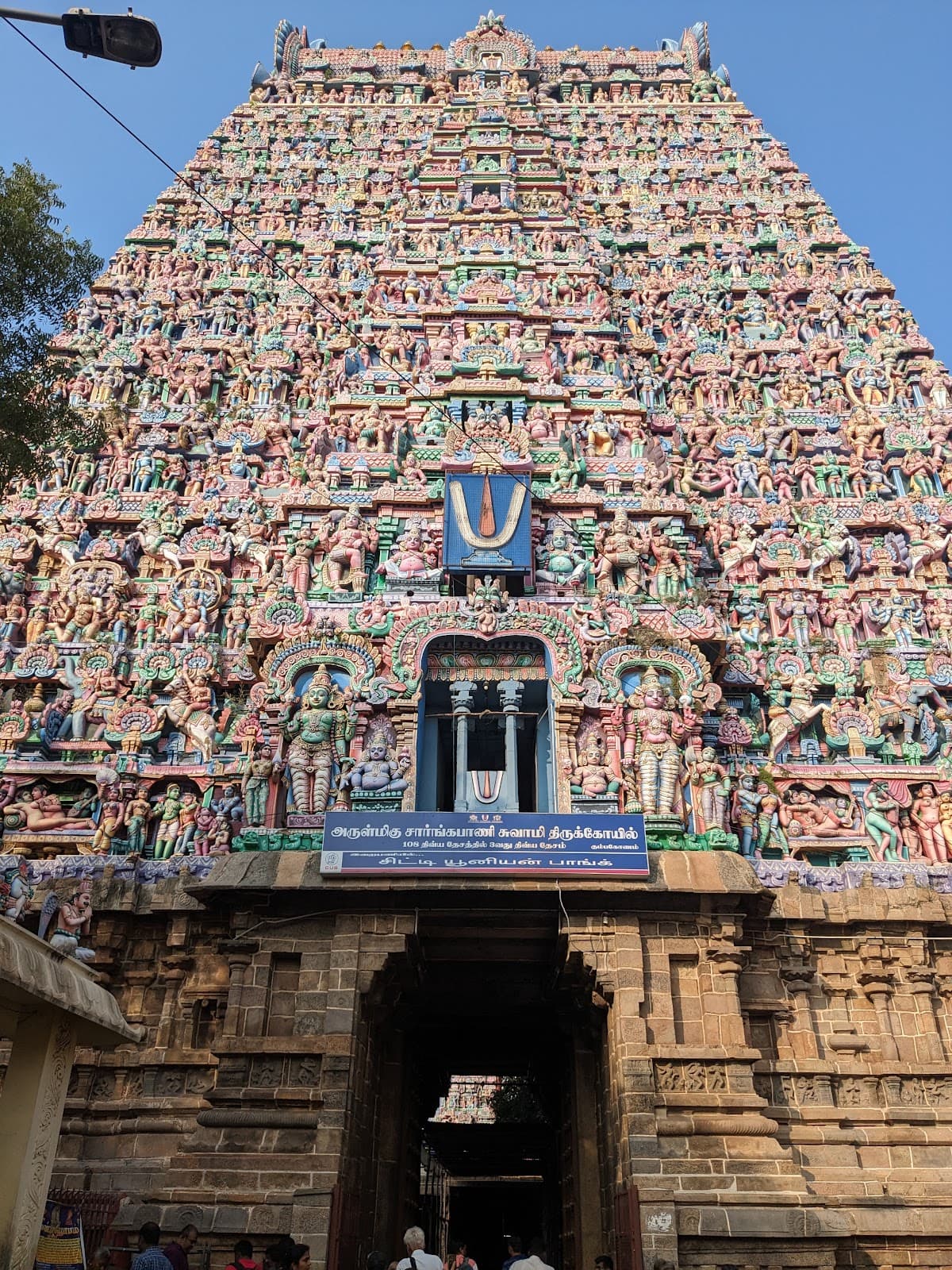

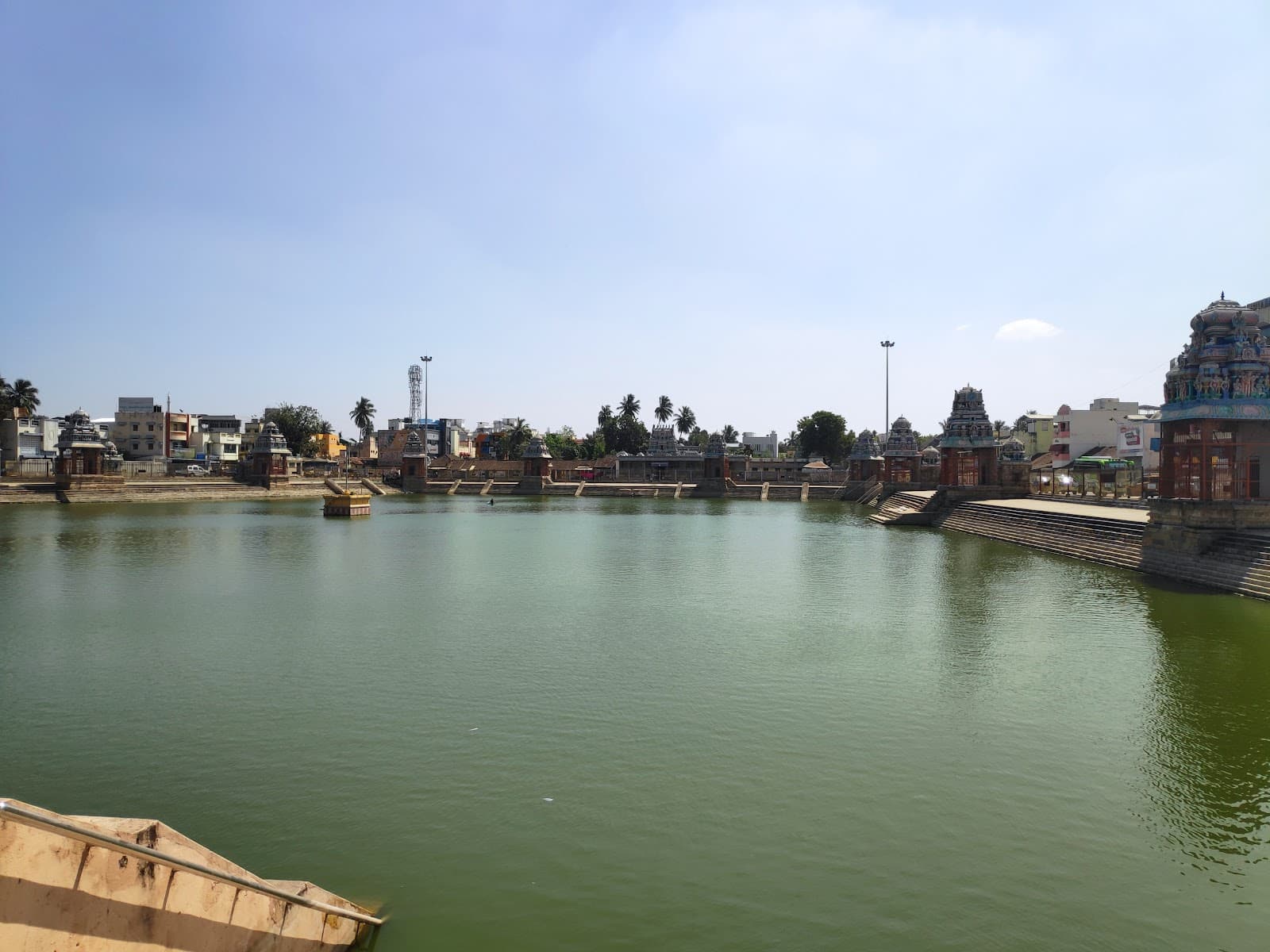

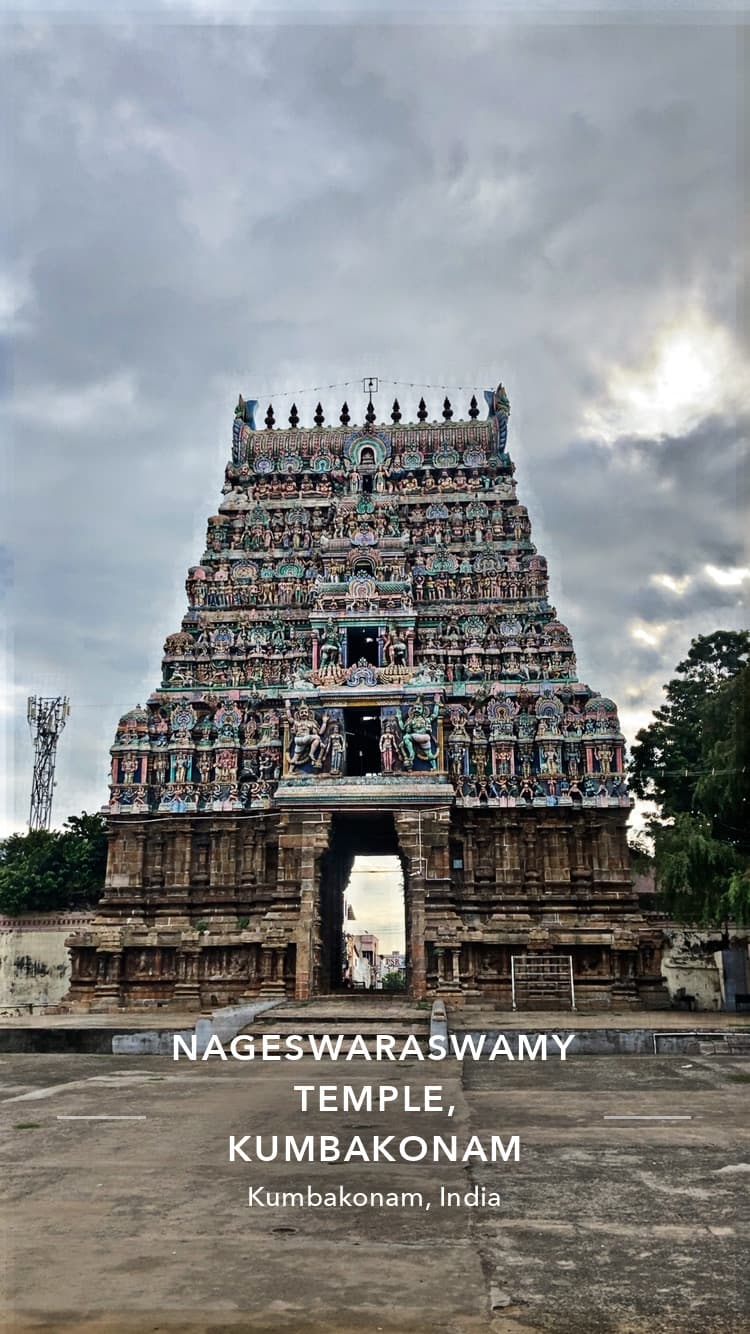
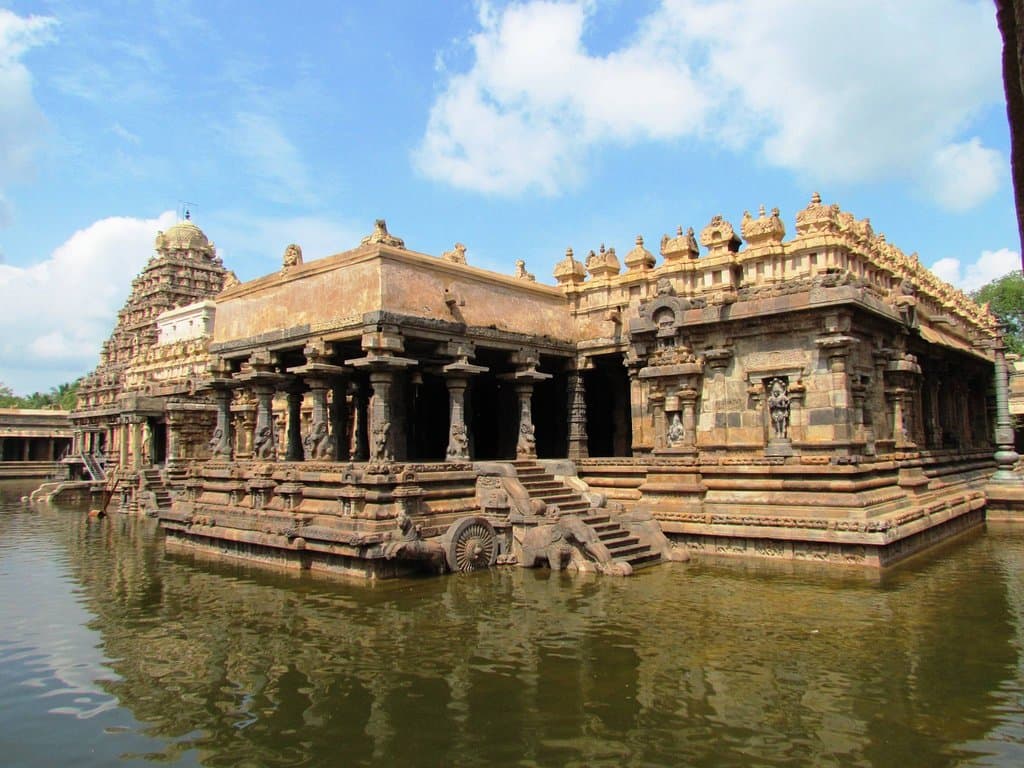
Social
from TikTok, Instagram & Reddit